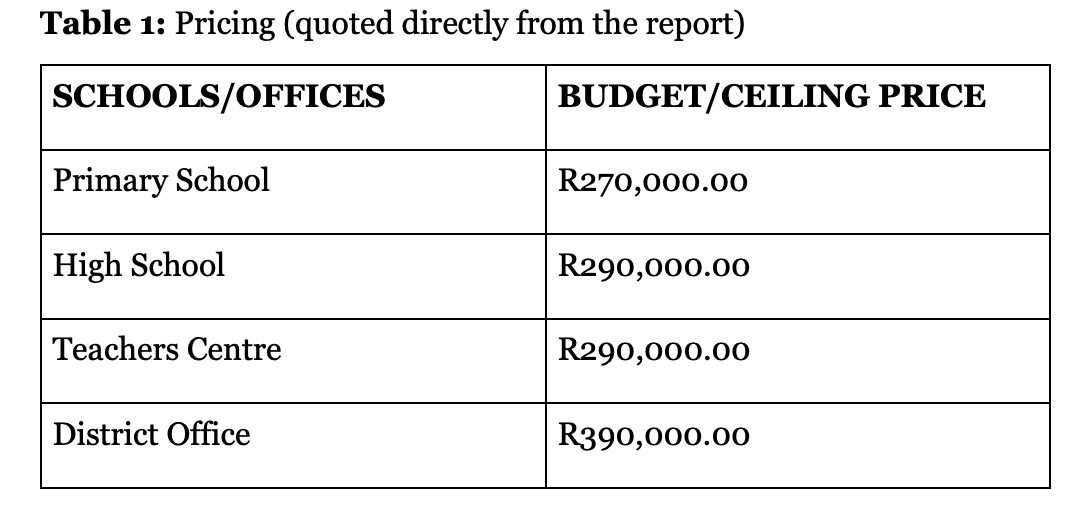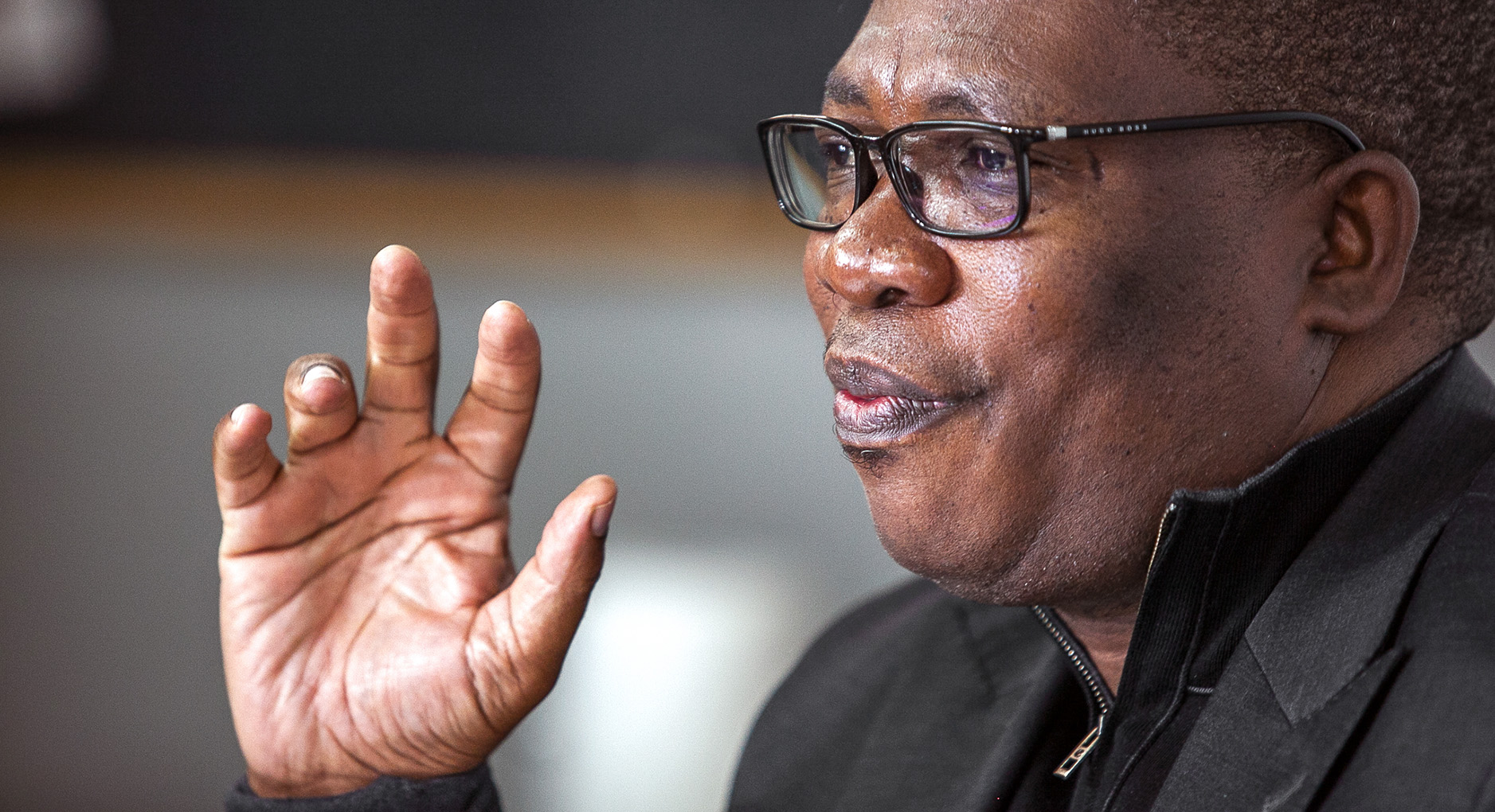This article is part of an ongoing investigation into Covid-19 wasteful and corrupt expenditure.
On 8 November last year, Maverick Citizen reported that the Gauteng Department of Education (GDE) had spent R98-million on decontaminating schools for Covid-19 in September 2020. At the time, departmental spokesperson Steve Mabona justified the large expense. He said it was necessary to allay fears of teachers, unions, SGBs and parents. He also explained that the cost was very high because of the large portfolio of buildings occupied by the GDE.
https://www.dailymaverick.co.za/article/2020-11-08-wasteful-irregular-dangerous-and-probably-corrupt-gautengs-covid-19-splurge-continues-this-time-in-schools/
Mabona added that the work was only paid for in September because invoices had been delayed “due to Covid-19 restrictions, certification and verification processes within schools”.
However, what Mabona did not explain was that the R98-million was only a small fraction of the costs the GDE had incurred. Since then the Gauteng Government Expenditure Disclosure report for October 2020 reveals that a further amount of R260-million was paid for “sanitising of buildings” in that month alone. This was made in 947 separate “sundry” payments, each in the region of R250,000, many to the same companies.
When Maverick Citizen tried to get further explanation from the GDE about the additional R260-million we were initially stonewalled. Mabona referred us to his response on 6 November and declined to acknowledge two further emails.
Premier David Makhura also overlooked a question about the costs in a media briefing on 12 January.
Eventually, in a WhatsApp message Panyaza Lesufi, the MEC for Basic Education in Gauteng, responded: “I was and I am still not aware of that cost. Will ask the HOD [Edward] Mosuwe who deals with such matters to respond to you.”
The day following Lesufi’s intervention a full report was sent to Maverick Citizen. Shockingly, this report which is compiled by the Infrastructure Management Directorate in the GDE, reports that the amount spent on sanitising schools in only three months (between June and August 2020) has amounted to a total of R431,274,959.
https://www.scribd.com/document/491932986/Decontamination-Disinfection-Deep-Cleaning-and-Sanitization-of-Schools
According to the GDE report suppliers were paid at the following rates:

The report provides a full list of all the companies that provided cleaning services and the amounts they received and states that:
“Service providers were appointed from the CSD (Central Supplier Database) considering their speciality. Appointments based on capacity and availability (24 hours turnaround time) through the emergency procurement processes using the emergency procurement process during the first portion of the pandemic as allowed and adjusted by the National and Provincial Treasury.”
However, very few of the companies listed in the report appear to have any prior specialisation in disinfection. There is also no indication as to exactly what or when each company performed its service.
As a result, last week Maverick Citizen contacted MEC Lesufi with further questions and the suggestion that he report it to the SIU. On Sunday we received the following response from Mabona:
“MEC Lesufi is taken aback and will study a report compiled by the HOD and CFO to determine immediate action to take and which appropriate institutions of the state to use accordingly.”
Is it a justifiable expense?
As the MEC starts his own investigation, we have been doing our own over the last few days. The question is: could there possibly be a justification for spending R431-million?
Below are our findings and conclusions.
The GDE report states that “Making school environments safe by decontaminating, deep cleaning and sanitising the affected area(s) combats airborne contaminants” and was a “critical dimension for school reopening and recovery”. To test this Maverick Citizen tried to find out what the real costs of sanitising schools is by speaking to several school principals.
A principal of a 1,000 learner quintile four (an explanation of the division of schools into quintiles can be found here) primary school, who asked not to be named, said the GDE’s support to his school had been limited to providing two cloth masks per learner (when school reopened in June) and 25-litre barrels of hand and surface sanitiser once per month, at a ratio of approximately one barrel per 100 learners.
“The rest we do ourselves”, he said.
A principal of a large 1,200 pupil no-fee secondary school on the East Rand reported that the budget for sanitising is managed entirely from the district office:
“They supply sanitiser and masks for teachers and pupils (two cloth masks each and five 25-litre barrels of sanitiser every three months).” Otherwise, the school uses ordinary cleaning materials paid for out of its norms and standards budget.
The principal said that on the one occasion when a student had tested positive a private company, Bidvest he recalls, came in to fumigate the school. “They came with machines and chemicals and sprayed classrooms.”
By contrast, the principal of a private school in Gauteng told us:
“We did all the sanitising ourselves. We had two staff dedicated all day to all high touch surfaces like doorknobs and also sprayed every classroom and desk after school. We had stations throughout the school and spray bottles in each class at printers, etc.
“We also supplied all staff with personal hand sanitiser that gets refilled as and when.”
She estimated that, “the average spend per month on alcohol sanitiser alone is R10,845 this not including soap, paper towels in every bathroom”.
Another of the arguments made by the GDE was that in decontaminating schools it was responding to the demands of teacher unions who “said they will only allow teachers back into classrooms once schools have been decontaminated deep cleaned and sanitised”. GDE head, Edward Mosuwe, explained that the GDE was under “constant pressure from SGBs all over the province” and had to respond immediately.
Mosuwe also argued that the GDE was acting in a context where scientific knowledge of the transmissibility of Covid-19 was in its infancy; and where government labour regulations sometimes gave conflicting directions regarding measures to ensure safety in the workplace. He admits “we may have been taken for a ride initially” but insists that since September, spending has been reined in.
We looked into these defences and found the GDE’s claim is not supported by the law. To assist Maverick Citizen, a labour lawyer combed through the regulations issued by the Departments of Health, Basic Education and Labour. She found that all three departments were consistent in requiring cleaning of surfaces with disinfectants “that contains at least 70% alcohol and complies with the recommendations of the Department of Health”, but at no point did any government department make decontamination or “defogging” a requirement.
The DBE issued statements to this effect on 11 March, 29 May and 22 June; the Department of Labour on 29 April and a Consolidated Direction on 1 October.
The net effect of these guidelines is that ignorance of the science or the law really is not a defence.
In fact, on June 10 2020 (just as the GDE was beginning its spending binge) the Department of Health issued a categorical statement on ‘cleaning and decontamination of workplaces’ which makes specific reference to including “educators/teachers and administrative personnel and scholars returning to school or higher education institutions” and states:
“The Department of Health does not endorse or require ‘deep cleaning’ that involves fumigation, demisting or fogging. Nor does the Department of Health require such a ‘certificate of cleaning’.”
All of this reinforces a comment made by Wits University’s Prof Francois Venter, the director of Ezintsha, who says “There is no reason to disinfect schools. There is absolutely clear guidance on this, which has been in the public domain since early last year. It is a gross waste of money and potentially dangerous.”
Education specialist and senior research associate at the University of Johannesburg, Professor Mary Metcalfe, described the R430-million as “astounding”. She pointed out that “there are Standard Operating Procedures for everyday sanitising surfaces”.
Metcalfe also warned that “this is only information about Gauteng; this is a national challenge that requires much better management, better procurement and better supervision, as other provinces may be even worse.” DM/MC
This is an ongoing investigation. Up to this point, the audits of the office of the Attorney General have not looked at the contracts and costs of sanitising schools. In addition, the SIU has focussed on PPE procurement by the Department of Health. The prima facie evidence of wasteful and possibly irregular expenditure suggests this will have to change.
South Africa
Gauteng Department of Education spent R431-million in three months on unnecessary ‘deep cleaning’ and ‘decontamination’ of schools





